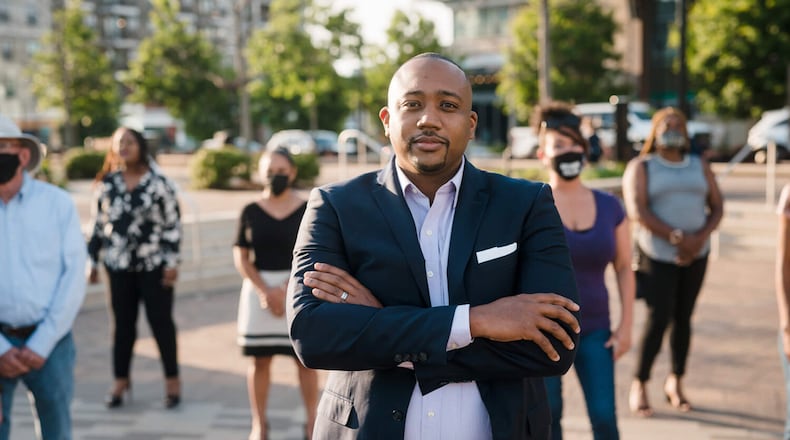When Dontaye Carter decided to run for mayor of Sandy Springs he steeled himself for political battle, never thinking his campaign would lead him to fear for his family’s safety.
Last week, Sandy Springs police investigated emails sent to Carter that the candidate thought were threatening. Carter, who is Black, filed a police report and requested patrol cars in his neighborhood and close to his home as well as outside of his daughter’s daycare center, Sgt. Sal Ortega, the police department’s public information officer, told The Atlanta Journal-Constitution.
The 35-year-old political newcomer told the AJC that he thought the writer of the emails had taken statements he’d made while campaigning out of context. In emails Carter provided to the AJC, the candidate told the man he was misinterpreting his views on vaccine requirements. The man’s email responses described Carter and his 3-year-old daughter with disparaging words and said he wished for the candidate’s demise.
“It did bother me,” Carter said. “And then he brought my daughter into it … My wife said this is not what she and my daughter signed up for. And it really just put them in harm’s way.”
Carter, other candidates and some residents say skin color is playing a role in the Nov. 2 election; unfairly distracting voters from important issues and the candidates’ political positions.
Longtime resident Renee Hoelting said she believes some residents and candidates are using fears of Buckhead crime spilling into Sandy Springs as a tactic against Black candidates. Flyers with such themes have been left in her mailbox she said, adding that the underlying message to neighbors is that “if they vote for these Black folks, we will become another Atlanta.”
“It’s so distressing as a white person to see this happening in the city,” Hoelting said. “It’s race-baiting.”
A total of 17 candidates are running for mayor or city council in Sandy Springs including five people of color which is historic for the city that incorporated in 2005.
In addition to Carter, Megan Harris is running in District 1 (against incumbent John Paulson); Melody Kelley is running in District 2 (she and opponent Linda Trickey seek to fill the seat being vacated by incumbent Steve Soteres); and Michelle Sullivan and Vernon Graham are running in District 4 (against Tochie Blad and incumbent Jody Reichel).
National political consultant Nicole Carty said a diverse group of people seeking office in the city is unsurprising given Georgia is a now a battleground state and the “energy for equality in America.” The summer of 2020 and reaction to the presidency of Donald Trump inspired people to run for office and others to vote last year, who didn’t vote in the past, she said.
The five candidates of color said they are running because they want a more diverse Sandy Springs City Council.
“What we’re trying to do is to have a different perspective at the leadership table,” Harris said. “All of us are running to be a value added to our city in each of our own ways … because we have a lot of exciting things happening in our city and there is a way to grow.”
Candidates targeted in Facebook post
Hoelting and other residents contacted the AJC about a screenshot of a post shared in the private group North End Sandy Springs Improvement Coalition. The post focused on Carter and District 2 candidate Melody Kelley. The post circulated throughout the city last week.
The Facebook commenter, in a 258-word post, said the two candidates were “dangerously unqualified” and would negatively impact business and police morale, and if elected crime would increase.
Both Carter and Kelley responded publicly on social media and to the AJC.
“I do see it as racist,” Carter said. “Ninety percent of my platform is support for the police and law and order. It’s disingenuous to tie me into crime when I’m not a criminal. I don’t have criminal record but they are insinuating ... the opposite.”
Kelley said her support for police is rooted in growing up as the daughter of a Louisiana police chief and the Facebook post was surprising to her.
“Ironically, I joined the race to help heal the divides in our community, not make them worse,” Kelley said in a statement to the AJC. “While I am saddened by the baseless attacks, signaling language and race-baiting tactics … I am confident that the residents will not be so easily manipulated.”
Trickey, who was one of several administrators on the North End Sandy Springs Improvement Coalition Facebook page, didn’t respond to AJC email questions about the online group or the tone of the campaigns for City Council. Her name was removed from the list of administrators following the post on Kelley and Carter.
“My campaign is focused on the issues that face the city and our residents and my desire is to run a positive campaign,” Trickey said via email.
Sandy Springs resident Christine Bruno said she disagrees that there is an underlying racially-charged tone in the Sandy Springs election. Bruno said questions or concerns about candidates based on their background is fair, particularly Carter who has called himself an activist during interviews with national media.
And she has used social media to ask Carter about his activism because he peacefully protested during the summer of 2020 following the death of George Floyd, she said.
Bruno posted on the Nextdoor social media site, in August, that in deciding who to vote for in the mayor’s race, she wondered if Carter supports defunding the police. Bruno shared a note on Nextdoor that she sent to Carter on that topic and also questioned whether he supports the Black Lives Matter movement.
She told the AJC Carter was “...Trying to intimidate voters by using the media to censor, intimidate and bully citizens, who care about their community, in an attempt to squelch open discussions of the strengths and policies of each candidate.”
Carter has said Floyd’s 2020 death at the hands of Minnesota police officer Derek Chauvin led to his run for office, and the social media posts unfairly characterize him instead of his actual platform.
“I don’t think it’s fair to be put into this box when I have been clear on what I support,” Carter said of his support for the police and affordable housing that allows officers and workers to live in Sandy Springs.
Carter should not have to worry about more interaction with the person he filed a police complaint against. After consulting with the Fulton County District Attorney’s Office and the Sandy Springs solicitor, police concluded the man’s statements were protected by free speech.
But Ortega, in a Saturday email to the AJC, said, “Our detectives have met with the resident in person and have interviewed him pursuant to this investigation. The resident understands to stop all communication with Mr. Carter immediately.”
About the Author
Keep Reading
The Latest
Featured





